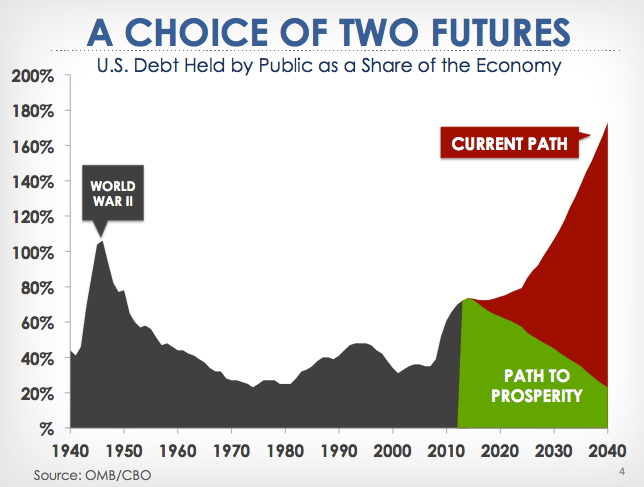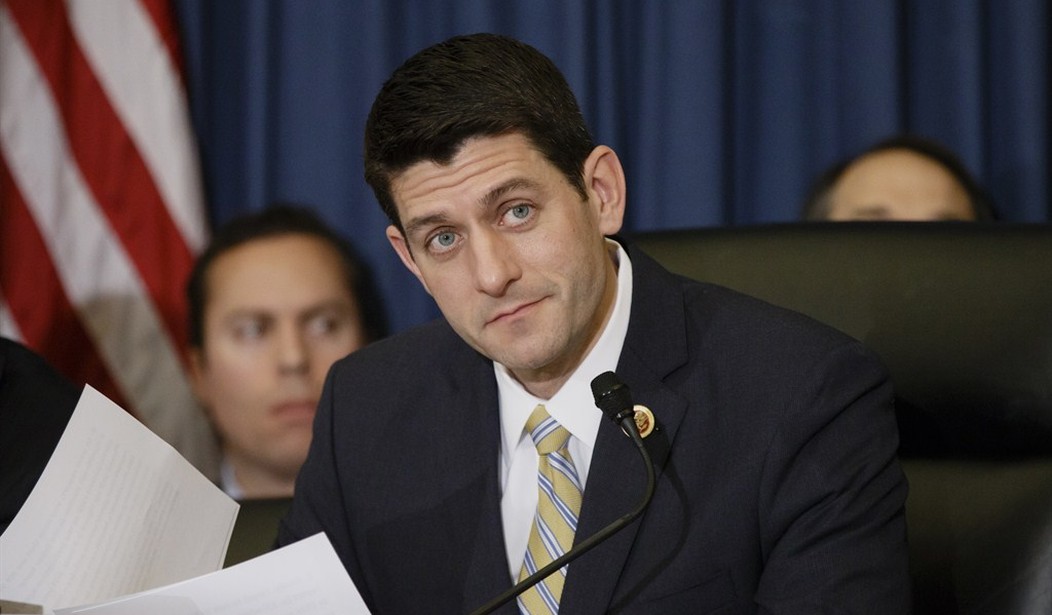There was some debate over whether House Republicans would offer any spending blueprint for fiscal year 2015, as some argued it would only hand Democrats ammunition ahead of the midterm elections. In light of the Ryan-Murray compromise spending caps that last for two years, why bother advancing a detailed budget? Those questions have been put to rest, as House Budget Committee Chairman Paul Ryan has introduced his FY '15 road map. It has zero chance of becoming law, but its very existence makes clear that Ryan and his colleagues take their responsibilities -- and the law -- seriously. The GOP proposal offers a number of object lessons in political priorities, especially when contrasted with Democrats' alternatives, or lack thereof. A quick primer:
The Republican "Path to Prosperity:"
(1) Balances within ten years. The nonpartisan CBO has determined that deficit reduction would spur economic growth. Spending levels for the next two years comply with the bipartisan agreement forged in December.
(2) Reduces federal spending by $5.1 trillion over that budget window by slowing the rate of spending growth. On the current trajectory, Uncle Sam is set to spend nearly $48 trillion over the coming decade, at an average annual growth rate of 5.2 percent. The Republican plan would spend $42.6 trillion over the same time horizon, scaling back the rate of spending growth to 3.5 percent. Last month, CBO projected that current policy would add $7.3 trillion to the national debt by 2024.
(3) Secures the safety net by strengthening work requirements for able-bodied adults receiving welfare and food stamps.
(4) Affords flexibility to states by block-granting Medicaid (this budget repeals Obamacare, including its Medicaid expansion), and requires Congress and the president to fashion a plan to save Social Security -- which is generally viewed as the easier major entitlement fix.
Recommended
(5) Saves Medicare for future seniors, employing the bipartisan premium support system featured in previous iterations of this budget. Less affluent and sicker future seniors would receive more assistance than richer and healthier future seniors. Current seniors -- and anyone who was at least 55 years old in 2013 -- would see no changes. Yes, that "cushion" has effectively been sliced down from ten years to nine. The debt clock keeps ticking, and unless we corral our spending on our own terms, Americans will soon enough experience the very unpleasant business of actual austerity. The government's own bookkeepers have concluded that absent reform, Medicare will be insolvent within the next dozen years.
(6) Simplifies the tax code and broadens the tax base by reducing income brackets to just two: 25 percent and ten percent. The plan repeals the Alternative Minimum Tax (which every year must be "patched" to avoid impacting the middle class), and lowers the corporate tax rate to 25 percent. In exchange for a simpler system and lower rates, a number of deductions and loopholes would be closed. Though this plan doesn't mirror Dave Camp's reform proposal, it's a safe bet that some of the specifics would be shared.
More details, including spending on the military and veterans, is available HERE. Ryan offers this graphic to hammer home the urgency of reform:

President Obama's 2015 Budget Proposal:
(1) Never balances. Ever.
(2) Increases spending, ballooning the national debt by $8.3 trillion over the budget window -- $1 trillion beyond than the unsustainable current trajectory. Under Obama's plan, the red ink on the above chart would be steeper, sooner.
(3) Raises taxes by an additional $1.8 trillion (and again, never balances).
(4) Makes no attempt at reforming the gathering tidal wave of unfunded promises that Obama has admitted in the past are driving a long-term debt crisis.
Senate Democrats' 2015 Budget Proposal:
(1) Does not exist.
Additional notes: Senate Democrats have failed to even attempt a budget in four of the last five years. Harry Reid doesn't care for the House Republican Budget, which he linked to -- surprise! -- the Koch Brothers:
The budget proposals drafted by House Budget Chairman Paul Ryan have been a blueprint for a modern Kochtopia. It's the Koch Budget.
— Senator Harry Reid (@SenatorReid) April 1, 2014
Shorter Reid: Republicans' ideas are unacceptable! But we'll offer no solutions of our own this year! Also, Kochtopus! I'll leave you with an ad reminding Reid of his incandescent billionaire hypocrisy:

























Join the conversation as a VIP Member